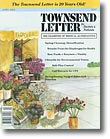


April 2003
by Eric Schlosser
review by Beatrice Trum Hunter

Fast Food Nation, the Dark Side
of the All-American Meal
by Eric Schlosser
Perennial, HarperCollins Publishers, Inc.
10 East 53 St.
New York,
New York USA
Quality paperback, black/white photographs
$13.95 US ($21 Canada)
383 pages
Landmark books about the shortcomings of the food supply have been
published at intervals by concerned citizens who have studied the problems
diligently, and have been dedicated to the task of alerting the public.
Both Upton Sinclair's The Jungle (1906) and F.J. Schlink and
Arthur Kallet's 1,000,000,000 Guinea Pigs (1933), in the best
tradition of muckrakers, led to Congressional inquiries and reform
measures to strengthen public protection. Now, another landmark book,
Fast Food Nation (2002) by Eric Schlosser, in the same tradition, should
alert the American public to what the author terms, in his subtitle, "the
dark side of the all-American meal." May this landmark book
arouse a lethargic public, insensitive public officials who are guardians
of health, and unscrupulous food processors, to the glaring shortcomings,
failures, and hazards of our current food system.
Schlosser has examined every facet of the American food supply, from methods
of growing and producing commodities, processing them, to their retail sales
and consumption. Rather than focusing narrowly on the popular fast food outlets — the
symbol of the ultimate development of industrialized food — Schlosser explores
all the intricately interwoven aspects that influence food production and consumption.
To humanize the problems, the author begins each chapter with a personalized
account of a real person, set in a real environment. The faces are woven into
the personal account. The technique is highly effective, for the reader can
identify with the individual and the problems he or she encounters.
In Schlosser's concluding remarks, he expresses a hope that "future
historians…will consider the American fast food industry a relic of
the 20th century — a set of attitudes, systems, and beliefs that emerged
from postwar southern California, that embodied its limitless faith in technology,
that quickly spread across the globe, flourished briefly, and then receded,
once its true costs became clear and its thinking became obsolete…Whatever
replaces the fast food industry should be regional, diverse, authentic, unpredictable,
sustainable, profitable — and humble. It should know its
limits. People can be fed without being fattened or deceived. The new century
may bring an impatience with conformity, a refusal to be kept in the dark,
less greed, more compassion, less speed, more common sense, a sense of humor
about brand essences and loyalties, a view of food as more than just fuel.
Things don't have to be the way they are…"
Fast Food Nation is well-researched. Some 63 pages of author's notes
document his materials thoroughly. Schlosser has tried to write a balanced
account. The book is a wake-up call to activate concerned consumer's
responsive legislators, and enlightened food industry executives. The book
is highly recommended reading. It is a first-class muckraker that deserves
thorough study, followed by appropriate actions.
Eric Schlosser is a correspondent for The Atlantic
Monthly. He is the recipient
of numerous journalistic honors, including a National Magazine Award for his
article on marijuana and the so-called war on drugs. Fast
Food Nation has been
on The New York Times best seller list, and widespread recognition is deserved.
![]()
Search
our pre-2001 archives
for further information. Older issues of the printed magazine are also
indexed for your convenience.
1983-2001
indices ;
1999-Jan. 2003 indices
Once you find the magazines you'd like to order, please use our
convenient form, e-mail subscriptions@townsendletter.com,
or call 360.385.6021 (PST).
All rights reserved.
Web site by Sandy Hershelman Designs
